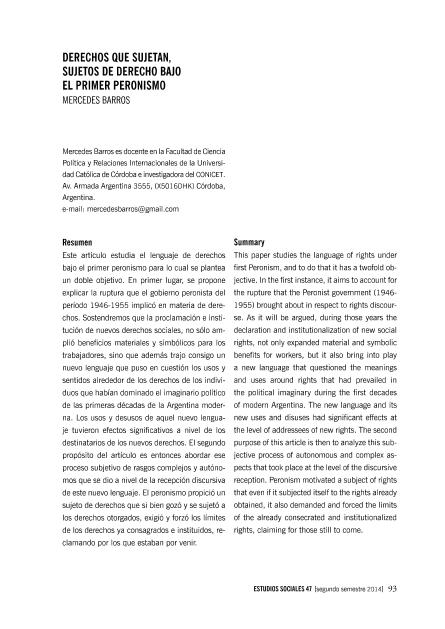Mostrar el registro sencillo del ítem
dc.contributor.author
Barros, Mercedes María

dc.date.available
2017-01-17T20:10:11Z
dc.date.issued
2014-10
dc.identifier.citation
Barros, Mercedes María; Derechos que sujetan, sujetos de derecho bajo el primer peronismo; Universidad Nacional del Litoral Facultad de Humanidades y Ciencias Departamento de Letras; Estudios sociales; 47; 10-2014; 93-128
dc.identifier.issn
2250-6950
dc.identifier.uri
http://hdl.handle.net/11336/11500
dc.description.abstract
Este artículo estudia el lenguaje de derechos bajo el primer peronismo para lo cual se plantea un doble objetivo. En primer lugar, se propone explicar la ruptura que el gobierno peronista del período 1946-1955 implicó en materia de derechos. Sostendremos que la proclamación e institución de nuevos derechos sociales, no sólo amplió beneficios materiales y simbólicos para los trabajadores, sino que además trajo consigo un nuevo lenguaje que puso en cuestión los usos y sentidos alrededor de los derechos de los individuos que habían dominado el imaginario político de las primeras décadas de la Argentina moderna. Los usos y desusos de aquel nuevo lenguaje tuvieron efectos significativos a nivel de los destinatarios de los nuevos derechos. El segundo propósito del artículo es entonces abordar ese proceso subjetivo de rasgos complejos y autónomos que se dio a nivel de la recepción discursiva de este nuevo lenguaje. El peronismo propició un sujeto de derechos que si bien gozó y se sujetó a los derechos otorgados, exigió y forzó los límites de los derechos ya consagrados e instituidos, reclamando por los que estaban por venir.
dc.description.abstract
This paper studies the language of rights under first Peronism, and to do that it has a twofold objective. In the first instance, it aims to account for the rupture that the Peronist government (1946- 1955) brought about in respect to rights discourse. As it will be argued, during those years the declaration and institutionalization of new social rights, not only expanded material and symbolic benefits for workers, but it also bring into play a new language that questioned the meanings and uses around rights that had prevailed in the political imaginary during the first decades of modern Argentina. The new language and its new uses and disuses had significant effects at the level of addressees of new rights. The second purpose of this article is then to analyze this subjective process of autonomous and complex aspects that took place at the level of the discursive reception. Peronism motivated a subject of rights that even if it subjected itself to the rights already obtained, it also demanded and forced the limits of the already consecrated and institutionalized rights, claiming for those still to come.
dc.format
application/pdf
dc.language.iso
spa
dc.publisher
Universidad Nacional del Litoral Facultad de Humanidades y Ciencias Departamento de Letras

dc.rights
info:eu-repo/semantics/openAccess
dc.rights.uri
https://creativecommons.org/licenses/by-nc-sa/2.5/ar/
dc.subject
Derechos
dc.subject
Sujeto Político
dc.subject
Discurso
dc.subject
Primer Peronismo
dc.subject.classification
Ciencia Política

dc.subject.classification
Ciencia Política

dc.subject.classification
CIENCIAS SOCIALES

dc.title
Derechos que sujetan, sujetos de derecho bajo el primer peronismo
dc.type
info:eu-repo/semantics/article
dc.type
info:ar-repo/semantics/artículo
dc.type
info:eu-repo/semantics/publishedVersion
dc.date.updated
2017-01-17T19:23:13Z
dc.journal.number
47
dc.journal.pagination
93-128
dc.journal.pais
Argentina

dc.journal.ciudad
Santa Fe
dc.description.fil
Fil: Barros, Mercedes María. Consejo Nacional de Investigaciones Científicas y Técnicas. Centro Científico Tecnológico Patagonia Norte. Instituto de Investigaciones en Diversidad Cultural y Procesos de Cambio; Argentina. Provincia de Rio Negro; Argentina
dc.journal.title
Estudios sociales
dc.relation.alternativeid
info:eu-repo/semantics/altIdentifier/url/https://bibliotecavirtual.unl.edu.ar/ojs/index.php/EstudiosSociales/article/view/5090
dc.relation.alternativeid
info:eu-repo/semantics/altIdentifier/doi/https://doi.org/10.14409/es.v47i1.5090
Archivos asociados
